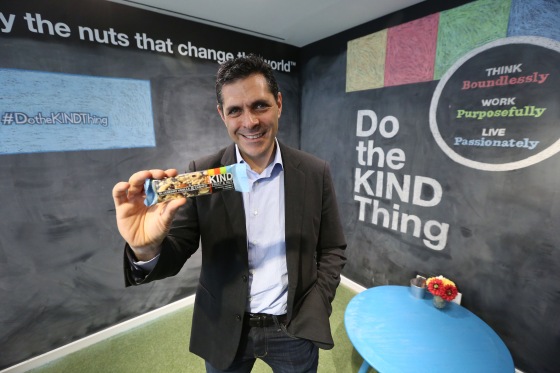
KIND CEO and Founder Daniel Lubetzky is seen in his New York office on Apil 17, 2015.
Photo Credit: Mariela Lombard / El Diario.
I met recently with a young man who is a grad student at Vanderbilt University here in Nashville. His academic focus is literature, with an emphasis on Holocaust literature. He is interning with the Tennessee Holocaust Commission and is working with them to create a second generation survivors support group in Nashville. He is not Jewish and I confess I am fascinated by his intense connection and interest in the Holocaust. I have not met many non-Jews who feel as he does.
During our two-hour coffee, we talked of many things related to being Jewish and my experience living with a second-generation survivor. I, of course, asked about his unlikely interest in the topic and he told me about an experience he had meeting a survivor during a speaking engagement and how her story touched him deeply. It was this encounter that set him on his academic and professional path. We also talked about how these chance meetings and unexpected interactions could change the course of one’s life, and for those in the concentration camps, it could mean the difference between life and death.
My husband and I talk about this idea frequently. Why did his father survive? Was it some inherent survival instinct or just plain luck? Was it a combination of lucky circumstances and the ability to use that luck to stay alive? After our visit two years ago to the Polish camps at Auschwitz, Buchenwald, Majdanek and, Treblinka, it’s almost impossible to imagine anyone surviving. But some people managed, against all odds, to come out at the end of it.
The work of The Peretz Project is to give a voice to the children of the survivors, to learn more about the family culture that emerged after the Holocaust and maybe even to determine if there is some commonality to the survivor experience. I read a story recently in “The Jewish Week,” about second-generation survivor Daniel Lubetzky. You probably know his company, KIND Healthy Snacks, which manufactures those ubiquitous snack bars. He shared his father’s story of survival, which centers around a potato being thrown to him by a Nazi soldier while he was in Dachau. What follows that pivotal moment led to the creation of a multi-million dollar company that also includes a commitment to social action, a core Jewish value.
What makes a survivor? Luck, skill, faith, strength, genetics…what do you think? Has a chance encounter changed the course of your life? Why? How? If you have a survivor story to share, contact theperetzproject@gmail.com.
